What can be learnt from Chinese automakers in combating against COVID-19?
Shanghai (Gasgoo)- As one of mainstays to the development of national economy, China’s automobile industry takes the brunt of the shocking waves sent by the COVID-19 epidemic. Nonetheless, the emergence of some new industrial scenarios and novel ideas still demonstrate the inherent dynamism and resilience of China's economic growth.
Gasgoo hereby summarized the measures adopted by Chinese automobile companies to fight against the “war without smoke”. As the severer situation outside China has made the “epidemic” escalate to “pandemic”, we expect this report to show some experience about how they support the country and find the way out for themselves.
How they prepare for work resumption
With the coronavirus epidemic being effectively contained in China, OEMs and auto parts have been resuming works in an orderly manner.
According to surveys done by the China Association of Automobile Manufacturers (CAAM), automakers including Changan, Chery, Geely, JAC Motors, Brilliance Auto, Sinotruck and Yutong have all fully restarted operation as of March 11. Such major auto parts suppliers as Weichai, Continental AG, Faway, CITIC Dicastal, Yuchai and CATL have also witnessed their businesses 100% operational as of now.
The new good news has been reported from Hubei province as well. Work resumption is taking place across Hubei's auto parts companies, Xin Guobin, Vice Minister of China's MIIT said at a press conference held on March 13. For instance, some component suppliers in Xiangfan have restarted production. Besides, Dongfeng Motor Corporation, the hardest-hit auto group with most vehicle plants and parts suppliers located in Hubei, has seen its Shiyan truck manufacturing base go into resumption with the daily capacity topping 200 units. The joint venture Dongfeng Honda and the group's self-owned PV unit have both resumed production as well.
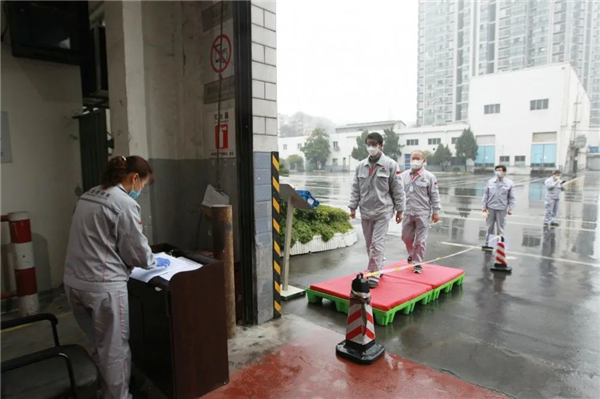
(Dongfeng Motor's WeChat account)
Since the regional lockdown has not been entirely removed yet, most companies are still paving the way for the future business relaunch. Let's see what efforts Dongfeng Trucks have made. It set up a special working group to evaluate the risks of auto parts supply disruption before giving corresponding solutions, and coordinate the purchase and delivery of the supplies used to contain the epidemic.
Besides, an information sharing mechanism has been built between the auto parts purchase and the material service & procurement departments to make clear about when and how many suppliers resume operation, and the influence brought by local policies, and comprehensively check and screen the risky factors appearing in links like logistics, employees’ safety as well as the supply of raw materials and tier 2 components.
Between March 6 and 8, Dongfeng charted 104 buses to bring back over 600 employees who were forced to stay home due to the epidemic. Some of them have begun conducting the equipment overhaul and maintenance, and disinfecting working place after they went through the health screening and relevant tests.
They are automakers, also mask makers
The dearth of face masks has promoted Chinese automakers to make their own to help fight the coronavirus. Up until now, companies like SAIC-GM-Wuling (SGMW), BYD, GAC Group, Changan Automobile and Skywell have joined the string, earning multiple thumbs-up thanks to their rapid response to the epidemic and flexible usage of their manufacturing capability.
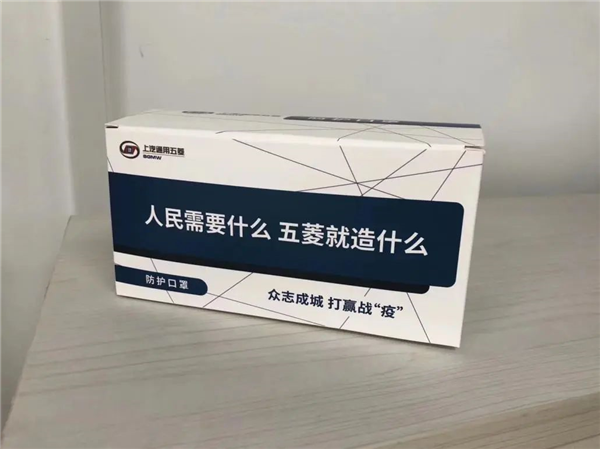
(Photo source: SGWM's WeChat account)
SGMW was the earliest doer. The joint venture announced on Feb. 13 its first batch of home-made face masks had rolled off the production line. “It took us only three days to roll out the first masks from putting forward this idea,” said the automaker.
To increase the mask daily outputs, SGMW decided to go deeper. With the first Wuling-branded mask-producing machine coming off the production line on Feb. 19, the automaker became China's first company that simultaneously makes both face masks and the equipment used to output masks.
BYD is another prominent one. After the company announced on Feb. 8 the resolute decision to produce the urgently needed medical supplies, all production lines running at full capacity are currently able to output 5 million masks and 300,000 bottles of disinfectant. The impressive capacity also makes BYD honored today’s largest mask producer in the world.
Impossible mission? So what!
Amid the anti-coronavirus battle, you must frequently hear of a vehicle type— “negative pressure ambulance”. Unlike the ordinary ambulance, this kind of ambulance uses negative pressure devices to make the air pressure inside a car lower than the outside, so that the air flows in a fixed direction (from outside to inside) and then is discharged out of the car after being sterilized. Thus, it is able to protect people from cross-infection when transporting patients.
Without the coronavirus outbreak, China's annual outputs of this special-purpose vehicle stood at roughly 50 units, while the volume has exceeded 100 units per day thanks to automakers working day and night and the coordination supports offered by China's MIIT and local authorities.
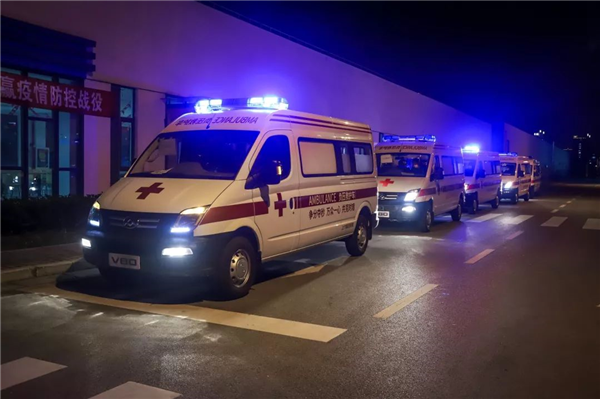
(Photo source: SAIC Maxus' WeChat account)
On the Lunar New Year's Eve, some key automakers in Shanghai, Anhui, Henan and other regions received the production task assigned by the MIIT which required them to hand over 200 negative pressure ambulances as soon as possible. As of Feb. 5, such companies as Jiangling Motors, SAIC Maxus, Fujian Benz, Yutong Group, Renault Brilliance Jinbei, Foton Motor and Chery REV had successfully completed the first stage of the mission.
On Feb. 6, the ministry gave the second-time task of 345 units. Powered by automakers’ round-the-clock efforts, a total of 360 negative pressure ambulances had been delivered to Hubei by Feb. 15, and over 2,000 units has been handed over nationwide as of now. Besides, the manufacturing cycle has been halved to 15 days to-date.
Technology is power
When cities go into lockdown and people have to observe quarantine, it quickly engenders plentiful troubles as the social contact is largely shut off. The other way around, the contact must be bridged because the access to health-care resources is extremely vital to the epidemic containment.
To solve that problem, many technology companies send autonomous vehicles to the battle lines, serving as a useful replacement of human in delivering goods without risk of person-to-person transmission. Besides, their participation also effectively mitigates the shortage of medical staff.
China's tech giants like Baidu, e-commerce titan like JD. com as well as a number of self-driving startups exert as much as their advantages without hesitation.
On Feb. 10, Baidu Apollo, the open-source autonomous driving tech platform of Baidu, announced it would open up its low-speed minicar kits and autonomous driving cloud services for companies to fight against the epidemic free of charge.
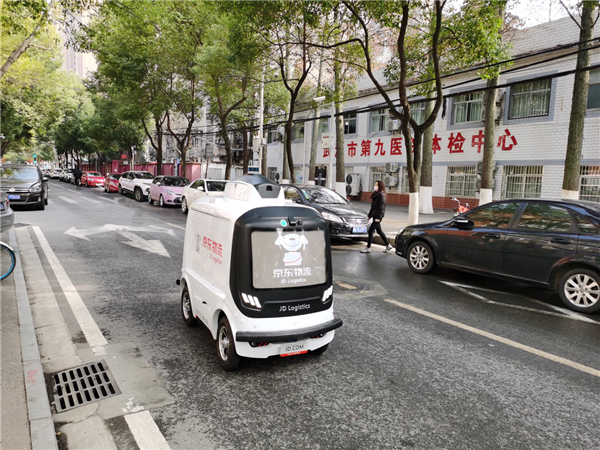
(Photo source: JD Logistics' WeChat account)
On Feb. 6, JD's autonomous delivery robot successfully completed its first delivery in Wuhan. Departing from JD's Renhe logistics station, the robot delivered medical supplies to the No.9 Hospital of Wuhan.
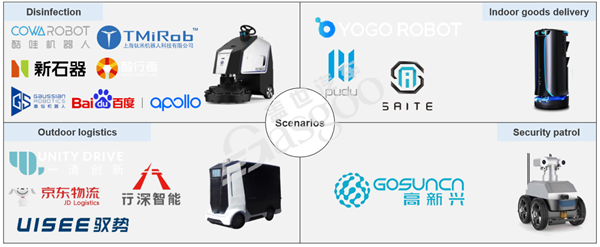
(Analyzed by Gasgoo Auto Research Institute)
The aforesaid cases are too few to draw the complete picture. By sorting out a plenty of materials, Gasgoo Auto Research Institute (GARI) found out that low-speed autonomous cars are mainly deployed to spray disinfectant, deliver goods indoors and outdoors, and patrol public places during the epidemic.
Car wearing N95 mask is not a rhetoric thing
Where there is risk, there is chance. Timely seizing the newly-emerged demands may be the key for companies to swiftly save them out of the plight, or at least lay a favorable foundation for the future rise.
The contagious respiratory disease promotes people to more highlight their breath quality when staying in car. Thus, the concept “healthy car” or “healthy cockpit” comes in front of the public. To offer a cleaner indoor environment, automakers and component suppliers throw themselves into the R&D of “healthy car” by means of adopting the higher-performance air filter, negative-ion generator, air quality monitor, disinfection devices and antibacterial materials, etc.
The most used method is introducing more advance air filter into cars. That's why the “healthy car” is figuratively regarded as the “vehicle wearing N95 mask”.

(Photo source: Geely Auto's WeChat account)
Geely took the earliest action on such business after the epidemic erupted. In early Feb., the automaker said all of its future vehicles would be equipped with Geely's G-Clean Intelligent Air Purification System (IAPS), a new system that is able to automatically filter out harmful particulates from the vehicles internal air environment.
Besides, the IAPS is also equipped with a negative ion generator that can sterilize and deodorize in vehicle pollutants, and aim to remove airborne viruses, bacteria, fungi, and molds, etc, achieving the same level of air filter as an N95 respiration system. The R&D is carried out under the Geely Healthy Car program, in which Geely would move to invest RMB 370 million initially.
Moreover, the ICON, Geely’s second BMA-based model that hit the market on Feb. 24, is the first mass-produced model carrying the automotive-grade “CN95” air filter—“C” is the abbreviation of “Car” and “N95” means the air filter can filter out 95% of particles with an aerodynamic diameter of or above 0.3μm. Currently, CATARC Huacheng Certification (Tianjin) Co., Ltd. is the only authority in China that has the right to do the “CN95” certification.
So far, such auto brands as Roewe, MG, GAC NE, Jetour, WEY, BYD, Oushang, Trumpchi, Qoros, Changan Mazda and JAC Motors have all announced similar kind of products.
Body temperature measuring car, another hardcore technical species
Another new species particularly created to combat against the coronavirus is the mobile temperature measuring vehicle. The effective body temperature measurement is the essential way to distinguish the suspected cases from the public and prevent a wider spread.
The one-to-one operation is available when people can still be numbered. However, in scenarios like subway and railway stations where a huge amount of passenger flow passes every day, the tool that can handle large-scale workloads flexibly is urgently needed.
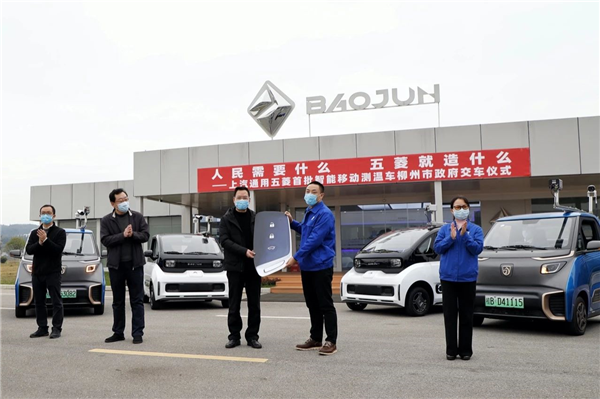
(Photo source: Baijun's WeChat account)
After rolling out masks and mask-producing machines, SGWM handed over on Feb. 20 the first batch of its self-developed smart mobile temperature measuring vehicles to Liuzhou government. Boasting compact car body and outstanding maneuverability, the Baojun E200 NEV is chosen as the carrier of hardcore technology. The automaker said the innovative vehicle is able to continuously measure body temperature over streams of people thanks to the vehicle-mounted AI facial recognition and infrared temperature measuring systems. Within a 2-meter distance, the measurement’s margin of error is plus or minus 0.2℃.
SGMW is not the unique one, but has its counterparts. Changan Automobile said it would provide Chongqing with thermal-imaging temperature-measuring cars free of charge from March 1. The solution it adopts is similar to that of SGMW, namely, adding AI-enabled cameras and infrared thermal imaging system.
Digital marketing may usher in golden age
During the extended business shutdown caused by the epidemic, most automakers and dealers fretted over the vehicles lying still in their warehouses and call forth all the faculties of the mind to sell products out. Therefore, the online marketing businesses have risen into favor with firms.
Such measures or forms as live-streaming sales promotion, VR showroom, crossover marketing and online shopping have constituted the key part of digital marketing solution hyped during the anti-coronavirus battle.
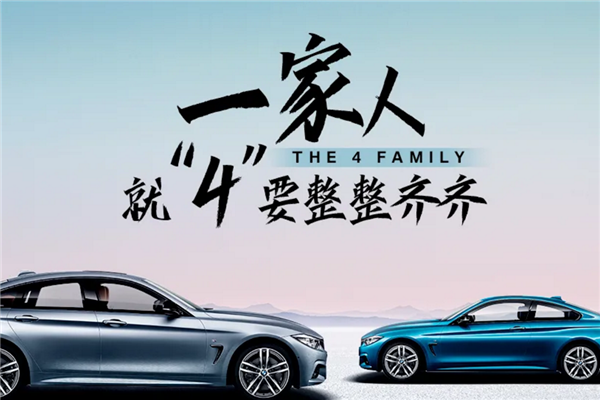
(Photo source: BMW China's WeChat account)
Some traditional automakers (ex. BMW) and startups (ex. NIO) won a great number of view counts for their online platforms during the outbreak, thanks to their professional marketing strategies or forward-looking deployment in new retail business.
According to GARI's analysis over published information, BMW organized quite a few official live-streaming activities from Feb. 10 to Mar. 1, which was unlike other brands that sold cars online through their scattered 4S shops. The hosts directly from OEMs know more and better of the products than ordinary salespersons from 4S shops.
Besides, the premium carmaker formulated a complete schedule to decide which model would be introduced. The bullet screen comments made the seller and users closer, and the lottery to some degree enhanced audiences’ sense of participation.
Using online platform is to display goods and offer services when the face-to-face contact cannot be taken. For NIO, “contactless” is in no way a strange word as it had offered such kind of services before the break. For instance, when enjoying services like repair, maintenance and “One Click for Power”, a car owner can authorize a NIO's customer service officer to unlock his car using NFC function. The whole process is carried out without any “contact”.
Amid the epidemic containment period, the startup also carried out live-streaming activities with different themes, including test drive and Gundam model building. The contents usually downplayed products while highlighted interaction experience, demonstrating the user-centric spirit NIO upholds.
Gasgoo not only offers timely news and profound insight about China auto industry, but also help with business connection and expansion for suppliers and purchasers via multiple channels and methods. Buyer service:buyer-support@gasgoo.comSeller Service:seller-support@gasgoo.com







